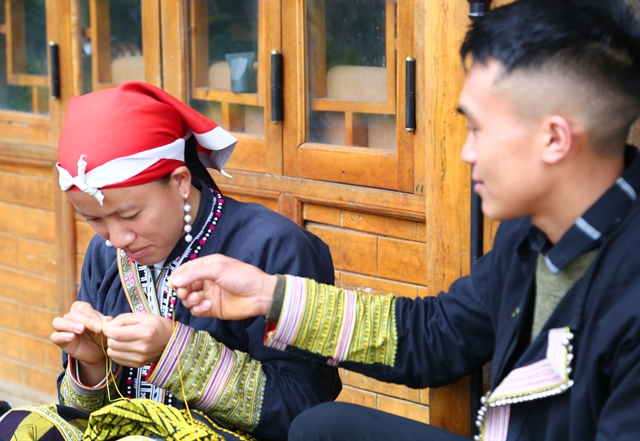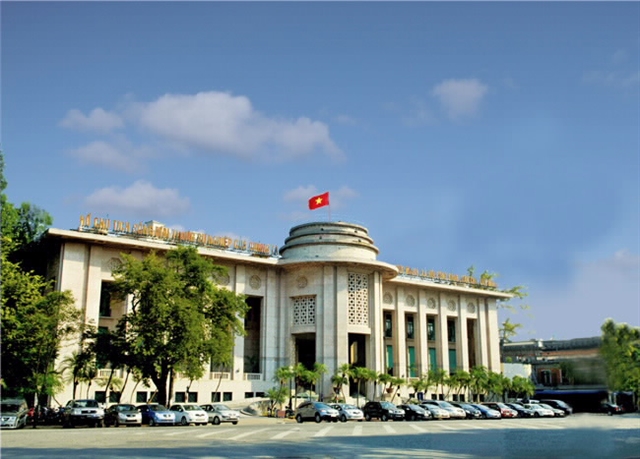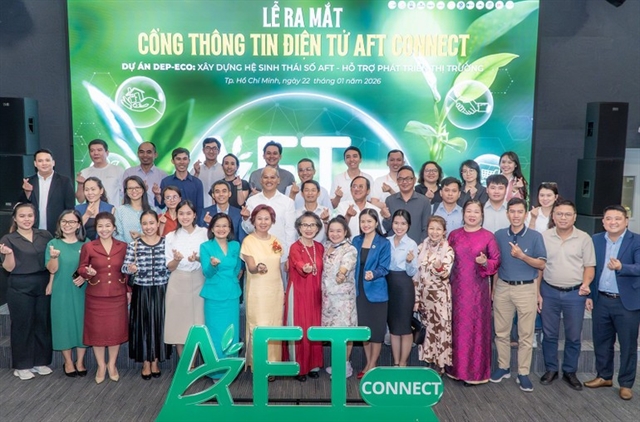 Society
Society


|
| A Dao Đỏ (Red Dao) man helps a Dao Đỏ woman make traditional brocade at Tả Phìn Community-based Tourism Co-operative. Up to 80 per cent of the participants in the co-operative are women. — VNS Photo Hồng Minh |
By Hồng Minh
LÀO CAI — In a typical Dao Đỏ (Red Dao) family, daughters are named Mẩy. Many Dao Đỏ parents in the northern mountain province of Lào Cai call their first, second and third daughters Tả Mẩy, Lở Mẩy and Sàn Mẩy, or first Mẩy, second Mẩy and third Mẩy in their language.
As the only daughter in a Dao Đỏ family with three brothers in Sa Pa Town’s Tả Phìn Commune, Lý Tả Mẩy used to see herself with a future husband upon whom she would be dependent.
She had to quit school very early as her parents thought it was not necessary for a girl and she was supposed to stay in the kitchen, learn to make brocade, work in the fields and wait for a husband to marry her.
Mẩy didn't want that future. Now 33, Mẩy is the leader of the Tả Phìn Community-based Tourism Cooperative which was established in September last year.
The co-operative has 47 members who oversee five types of tourism services which are homestays, making traditional brocade, herbal bath services, transport and tour guides. Its operations involve 50 households in the commune.
“Up to 80 per cent of the co-operative participants are women and I can see that working for the co-operative has really empowered them,” Mẩy said.
One significant example is Mẩy’s mother, who is also a member of the co-operative as a herbal bath provider.
“My parents have also changed a lot. In the past, my father was the only decision-maker but now my mother can decide more on family matters and can keep money,” she said.
Mẩy said the success of her cooperative in community-based tourism was thanks to the project led by Sa Pa Department of Culture and Information with support from the Gender Responsive Equitable Agriculture and Tourism (GREAT) Programme, an initiative funded by the Australian Government.
Besides Mẩy’s co-operative, GREAT is also working with three other partners in Sa Pa District including Sapanapro Company and Dao Đỏ Community Co-operative to promote herbal products and herbal bath services in Tả Phìn Commune and Lan Rừng (Wild Orchid) Company to develop traditional handicrafts in Sa Pa Town.
According to Mẩy, the training provided by the project has not only helped promote gender equality and increased the status of women, but also taught them a lot about running a business, as well as sanitation and environmental protection.
“In the past, when households worked separately, the prices were not stable and we did not record the expenses and income,” she said.
“Now as we are working together, we have a set price and started to make records every day of the money so that we know how much we earn.”
Mẩy added that the women could also apply what they learned into family financial management.
Another Mẩy in the co-operative, Lý Mán Mẩy, 47, said she earned money for the first time as a traditional brocade maker. In the past she only planted corn and rice for household consumption, however she now earns money from selling handmade brocade products and introducing her culture to tourists.
“I can buy some beauty products like lipstick from my money,” she said.
Sustainable harvest
Other partners in Tả Phìn Commune promoting herbal products and herbal baths have also benefited from the GREAT Programme with knowledge and skills in marketing and sustainable harvesting.
Lý Láo Tả, who works at Sapanapro, said that there were 100 local households participating in his company as collectors of herbs and plants.
Under the project, the households were also trained to plant some special herbs to promote sustainability and avoid overharvesting in the forest.
Each household can earn VNĐ2 million (US$86) a month from collecting the herbs and plants for the co-operative.
Cao Hùng, GREAT’s tourism advisor, said that the Tả Phìn Community-based Tourism Co-operative was on track.
“It is achieving the basic results as planned in the first year and is likely to achieve the goal by the end of the project,” he said, adding that the project had exceeded the year-end target for the number of people and women participating in tourism and benefiting from the initiative.
Regarding the target of increasing the number of tourists, Hùng said it would depend on the effects of the COVID-19 pandemic and the project is helping the co-operative to identify alternative markets.
“The project has created tighter business links in the community-based tourism value chain, promoted the improvement of the quality of products and services, and increased market access for members, especially women from the Dao and Mông ethnic groups,” he said.
“It has also helped households to do business by developing service groups, through the cooperative model, the community is supporting each other to improve service quality instead of operating alone.,” he said.
Hoàng Thị Vượng, head of Sa Pa’s Department of Culture and Information, welcomed the GREAT Programme, saying it helped empower women in disadvantaged areas, especially Dao Đỏ women.
“The way the programme is being implemented through tourism and agriculture means support goes straight to the women, making them the main beneficiaries,” she said.
“Gender equality does not mean we create too much work or put too much pressure on women to do it, but we have to create an equal working environment for both women and men,” she said. — VNS




